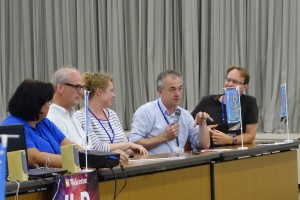
Scientists at the special session at ILC meeting in Oshu city From left: Mary-Cruz Fouz , Spain, Marcel Demarteau ANL, USA, Jenny List, DESY, Germany, Mark Thomson, Cambridge, UK, and Vincent Boudry , IN2P3, France Image: Rika Takahashi
From August to September, four ILC-related workshops were held around the potential construction site for the International Linear Collider. ILC scientists from all around the world were warmly and enthusiastically welcomed by local supporters, and had a glance of what life will be like at the candidate site.
On the evening of 6 September, a special session to discuss the creation of the ideal ILC town was held at Oshu city hall. Five scientists who attended the ILD meeting frankly exchanged views on a wide range of issues with local representatives Tokiko Onuki, Campus Designer of Tohoku University, Bill Lewis, Chair of the ILC support committee in Oshu city, Amanda Krips, public relations officer of Iwate prefecture, and Akira Kamei from Oshu city’s International Linear Collider Division.
Onuki, who is leading a local development working group towards the ILC at Tohoku University, made an investigation of existing infrastructures, for example the density of essentials for life such as schools, hospitals or shopping centres. Based on the study, she proposed three different models for the ILC campus locations. Type one is the location close to the beam collision point, and type two is near the Shinkansen bullet train station. The third candidate is in between type one and two. Onuki said that the area has a comfortable basic infrastructure and well-developed social services, however there will be more to do. “I believe that we need to create new education systems, and more multi-lingual support should be provided.” She also pointed out that people have a variety of lifestyles, and to decide which type of location is most desirable, asked the scientists to fill out a questionnaire to gather opinions from the residents-to-be.
Krips, who has been living in Iwate prefecture for five years, said she had trouble fitting into Japanese society at first. “The language barrier was the biggest problem,” she said. Getting a driving license was a prime example. “I needed to fail the exam three or four times before getting it!” She also had a hard time communicating with people, and knows some foreign residents who went back to their home country because they felt isolated. But she said it doesn’t mean that the people in the area are mean to foreigners. “It is just a lack of experience. For example, the concept of ‘vegetarian’ is not fully understood by Japanese people, so they don’t know how to deal with it.” In fact, after she got know people, and people got to know her, not only did she feel more comfortable, but now thinks it is a wonderful place to live. She introduced new activities with an eye toward the ILC in the area, such as international association formed by foreign residents, or English teaching programmes. “I don’t think this place will suddenly become a fluent English speaking area, but things are growing. Your opinion and constructive ideas are very important, and they are listening,” she called for opinions from scientists.
In the second half of the session, scientists in the panel gave their impressions of the site.
Jenny List, scientist at DESY laboratory, Germany, said it was very impressive to see the enthusiasm of the local people to invite the ILC. Scientists saw many posters to welcome the ILD meeting in front of the stores, and signs by the road while visiting the candidate construction site. Mark Thomson form Cambridge University in the United Kingdom said that he was also impressed by people’s enthusiasm, and the natural beauty around the site.
Both List and Thomson felt needs to secure jobs for spouses. Jobs for spouses who live in foreign countries are always an issue at every lab around the world. Local governments are keen to tackle this problem, and are discussing legal and working systems. Thomson also argued for good international schools.
Another local expat representative, Bill Lewis, has been living in Oshu for more than two decades. He says Iwate is “a great place to raise a family.” His children attended local public schools, and they received a good education, presenting the alternative of children of researchers attending local schools. He also said there are some jobs available if you are flexible, introducing his experience working at the supermarket “I did not speak any Japanese back then, but I learned a lot there,” suggesting a way to assimilate into the community.
There were more useful inputs from scientists such as the difference in the sense of commuting. To Japanese, commuting for one hour is not a big deal. But it could be a burden for many foreign scientists. “You say that it is only two hours from Tokyo to get to the site, and it is very convenient. Well, I would not really call that convenient,” said Vincent Boudry, from CNRS/IN2P3 in France. Food is another issue. “Even though Japanese food is excellent, we will miss our food, like French cheese and European breads,” Boudry said.
“It is just a beginning,” said Kamei, who is in charge of the communication activity for foreign residents in Oshu city. “We will welcome your suggestions and opinion. Please do not hesitate to contact us any time,” he said. Oshu city is producing the video entitled “Oshu for you” to introduce the life in the area. You can also write up comments on the videos.

Recent Comments